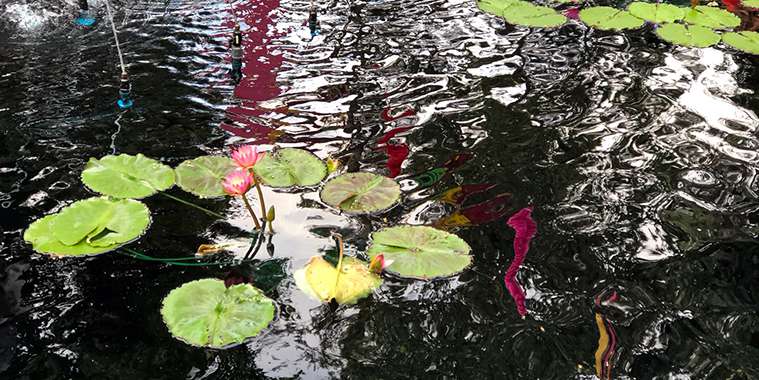By Dorothy Dobbie
Water in the garden is such a natural fit that every garden should have some. You can go big with a pond and a stream or small with a container full of aquatic plants; whatever you do, the rules are essentially the same.
Water plants have a mechanism called aerenchyma, a spongy tissue that forms spaces or air channels in the leaves and take in air from water through tiny holes in leaves, stems and roots that help them expel waste gases. In any water environment, you will note that certain plants have adapted to specific conditions. In general, they are categorized by planting depth:
• Marginal plants like to have wet feet in about six inches of water near the edges of ponds. This includes plants such as the tall and striking Iris pseudacorus, double marsh marigolds and cattails. You can use native cattails.
• Deep water plants like to be planted 12 to 18 inched deep and include water lilies and lotuses
• The submerged plants are aerators or oxygenating plants. This group includes hornwort, water thyme and parrot feathers. These plants use up nutrients to compete with algae and are important if you have fish.
• Finally, there are the bog plants that grow where it’s very wet but whose roots are not submerged.
• Some people add free floating plants such as the tiny duckweed or water hyacinth to provide shade in the pond, but these plants reproduce very quickly and you may find yourself in a battle with the greenery.
As long as the water is deep enough to avoid freezing to the bottom, deep water plants and oxygenators will survive overwinter.
A small fountain pump can keep the water in your pond moving to discourage mosquitoes and aerate the water. You can also install a bubble aerator to discourage algae. Bti (Bacillus thuringiensis israelensis) sold as “Mosquito Dunks” will kill mosquito larvae without harming plants, pets, birds or people. Bti is a naturally occurring bacterium that is targeted at mosquito larvae.
Copper kills algae, so many people add a little copper sulfate to their ponds. Be cautious, though. If you use too much, it can kill the fish. There are a number of commercial products containing copper sulfate. Follow the directions.
Place barley straw in your pond where there is a good flow of air and water. The barley straw will break down and add hydrogen peroxide, and in so doing, inhibit or prevent the growth of algae. If not sold commercially in your area, you can put ordinary barley straw in nylon bags that are located half in and half out of the water to encourage decay, which is what activates the natural ingredients.
A small container water garden is one way to get introduced to the challenge and fascination of water gardening.
Start with a large water-tight container, at least 18 inches deep by 36 inches in diameter. This will hold the water. you can plant a water lily in a smaller 10-inch-deep by 8-inch pot filled with heavy soil (not potting mix), laying the rhizome on the top of a three-quarter filled pot with the growing tip toward the centre of the pot. Cover all but the tip with the remaining soil. At this point you can add some gravel on top of the soil or you can wrap the whole thing in some burlap. This is to keep the soil from floating away when you submerge your potted water lily in the larger pot. Place the growing tip just below the surface of the water.
There are many different ways to create a pond, but the favourite is the dugout, lined with a pond liner or simply a preformed rubber container. Just remember to think how you are going to disguise the edges to make the pond look as natural as possible.
And what about fish? If your pond is four feet deep or deeper, goldfish can overwinter outside. You will have to have a six-foot fence to enclose your garden and keep youngster free from harm. 18 inches is sufficient for fish that will be overwintered inside or replaced annually.
Dorothy Dobbie is the owner of Manitoba Gardener, Canada’s Local garden magazine. Listen to her weekly show on CJNU 93.7 FM at 8:00 on Sundays.



